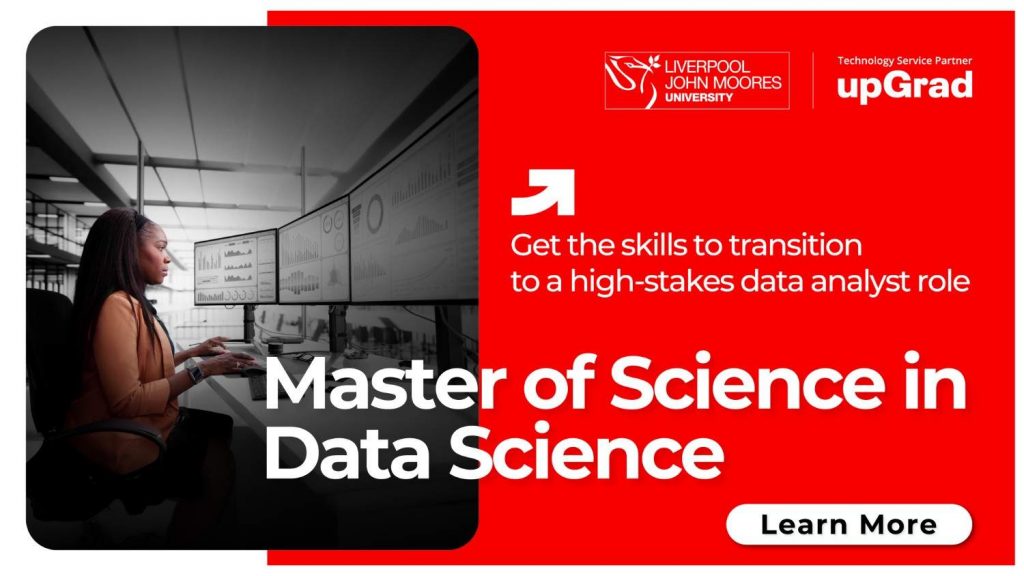Singapore’s rapidly growing tech ecosystem has positioned data science as one of the most sought-after careers today. However, many aspiring professionals face a key dilemma: Should they pursue a formal Master’s degree or rely on self-learning to break into the field? With the central question being – Is a master’s in data science worth it?—The decision is far from straightforward.
In 2023, a report by Great Learning revealed that 77% of professionals in Southeast Asia planned to upskill, and data science was one of their favourite domains. Moreover, with the surge in demand for data scientists across the globe, the decision to choose between an online Master’s degree in data science and self-learning has become more critical than ever. So, what’s truly worth your time and money?
Also Read: Why Take a Data Science Course in Singapore?
Comparative Analysis: Data Science Master’s Vs. Self-Learning
Are you trying to follow the latest trends in the field of data science? If so, you are likely torn between pursuing a formal Master’s degree or taking the self-learning route. Don’t worry; we are here to help you decide with a side-by-side comparison of both approaches.
Look at the detailed comparison between a Master’s in Data Science obtained through formal education versus self-learning.
| Criteria | Master’s in Data Science (Formal Education) | Self Learning |
| Structure & Curriculum | Structured syllabus with core modules and electives | Unstructured, self-paced learning methodology, depending on the chosen resources |
| Learning Resources | Access to licensed tools, labs, virtual libraries, and course materials | Relies on free or paid online resources, such as tutorials and community forums |
| Networking Opportunities | Robust alumni networks | Self-driven networking through LinkedIn and meetups |
| Career Support | On-campus placements, career counselling, and job fairs | Minimal career support, and the students must build their brand and portfolio |
| Time Commitment | 1-2 years full-time or part-time | Flexible depending on the learner’s availability and pace |
| Cost | Moderate fees for online courses and high fees for campus courses | Often free of cost or low cost |
Also Read: The Future of Data Science – Trends & Predictions
Pros And Cons Of Formal Education And Self-Learning
Whether it is formal education or self-learning, each approach has its own set of pros and cons. Let us acquaint you with both one by one:
Formal Education: Pros And Cons
Pros:
- Structured Curriculum: This curriculum offers a comprehensive approach to learning core concepts like machine learning, data visualisation, and statistics.
- Accredited Degree: A recognised qualification that adds credibility and value to your resume.
- Experienced Faculty: Opportunity to learn from expert instructors and mentors for academic guidance.
- Placement Assistance: Many universities offer dedicated career counselling, resume building, and placement assistance.
Cons:
- High Costs: Tuition fees and living expenses can be substantial, particularly in international programs.
- Time Commitment: Requires 1 to 2 years of full-time study, which may be a constraint for working professionals.
- Theoretical Focus: Not all programs offer real-world applications.
- Less Flexibility: Rigid schedules and syllabi may not accommodate individual paces or interests.
Self-Learning: Pros And Cons
Pros:
- Affordable: Often, free or low-cost resources are available for self-learning in fields like data science.
- Flexible Schedule: The most significant advantage is the ability to learn at your own pace, which is ideal for those striving to strike a balance between work and learning.
- Customizable Learning Path: Option to focus on areas of particular interest that are not covered in traditional courses.
- Portfolio-Driven: You can build a strong portfolio of personal or freelance projects to showcase your skills.
Cons:
- Lack of Accreditation: No formal degree, which may limit opportunities in specific roles or companies.
- Limited Guidance: Lack of guidance from a professional or experienced person in the field.
- Skill Gaps: Risk of missing the foundational concepts due to the fragmented nature of self-learning resources.
- Networking Challenges: Fewer opportunities to connect with peers and professionals in the field.
- When Formal Education Might Be The Better Option
Career Switchers Seeking Structured Learning
Those transitioning from a completely unrelated field, such as teaching or HR, to data science to switch their careers must choose a structured learning path, like an online Master’s in Data Science. This will help them get the comprehensive foundation they need.
Individuals Seeking Networking and Industry Connections
Secondly, individuals who are keen to build networks and industry connections should consider an online data science master’s program. This will help them secure better placement assistance, internships, and networking opportunities to land high-paying Data Science jobs.
Individuals Looking for Roles in Top Companies and Government Sectors
For those aiming to work in leading companies or government agencies, a Master’s in Data Science can be a valuable asset. A recognised degree from a reputable university can open doors to various lucrative data science career opportunities in Singapore.
When Self-Learning Might Be The Better Option
Tech-Savvy and Self-Motivated Individuals
Self-learning data science is the best option for those tech-savvy individuals who are already comfortable with tools like Python and Excel. Those who enjoy learning at their own pace and can stay motivated are well-suited for the self-learning format.
Individuals with Budget and Time Constraints
There is no denying that formal degrees come at a high cost and require a significant amount of time. Therefore, those working with a limited budget and time can choose self-learning as an affordable and more flexible option to pursue data science.
Individuals already in a Related Field
Professionals who are already working in analytics, tech, or software development may find the transition into data science through self-learning easier. They can apply their new knowledge directly to their current role and hone their existing skills with self-learning.
Get Job-Ready With Upgrad’s Cutting-Edge Data Science Curriculum
While formal education offers structure, credibility, and guided support that self-learning often lacks, the right choice ultimately depends on your individual goals, learning style, and career aspirations. If you’re ready to take the plunge into data science with formal education, partner with upGrad Singapore.
upGrad’s online platform offers Data Science programs that are crafted to make you industry-ready from day one. The curriculum combines theoretical foundations with practical applications, encompassing topics ranging from Python and Machine Learning to Big Data and Artificial Intelligence.
Explore the following Data Science programs through upGrad to get the best experience in formal education:
- Master of Science in Data Science – Liverpool John Moores University
- Post Graduate Diploma in Data Science (E-Learning) – upGrad Institute
- Executive Diploma in Data Science and AI -IIT Bangalore
- Post Graduate Certificate in Data Science & AI (Executive) – IIT Bangalore
For more information, email at query@upgrad.com or call +65-6232-6730.
FAQs on Data Science Master’s Vs. Self-Learning In Singapore
Q: What are the job prospects for data science graduates in Singapore?
Ans:- There is a growing demand for data science graduates in Singapore in industries like:
- Logistics
- Healthcare
- Tech
- Finance
- Government Sectors
Q: Is a Master’s in Data Science necessary to get a job in Singapore?
Ans:- No, a Master’s in Data Science is not necessary to get a job in Singapore, but it does improve your chances. It prepares one for high-level roles in Singapore.
Q: Are online Master’s programs recognised by employers in Singapore?
Ans:- Yes, many employers in Singapore recognise online Master’s programs if pursued by a reputable and accredited university or institute. They no longer prioritise traditional campus degrees and now give equivalent importance to online degrees.
Q: Is Singapore good for a Master’s in Data Science?
Ans:- Yes, Singapore is now emerging as a hub for globally ranked universities and institutions that offer high-quality programs in data science. Moreover, the country’s strategic location, rapidly growing tech ecosystem, and focus on innovation make it a prime destination for aspiring data scientists.
Q: How long does it take to become proficient in data science through self-learning?
Ans:- The duration to learn data science through self-learning depends on your background, learning pace, and consistency in practice. It may take between 18 months to 3 years to become proficient in data science through self-learning.





















